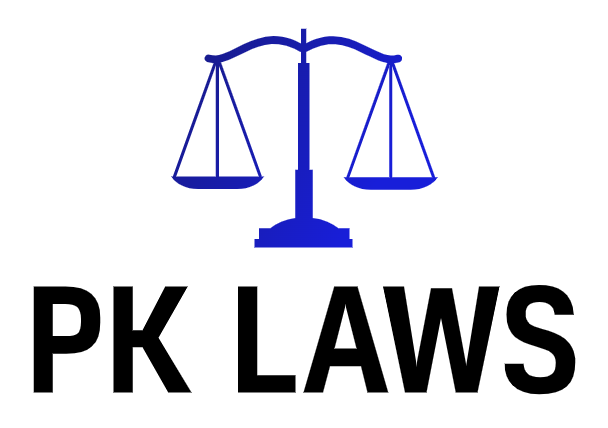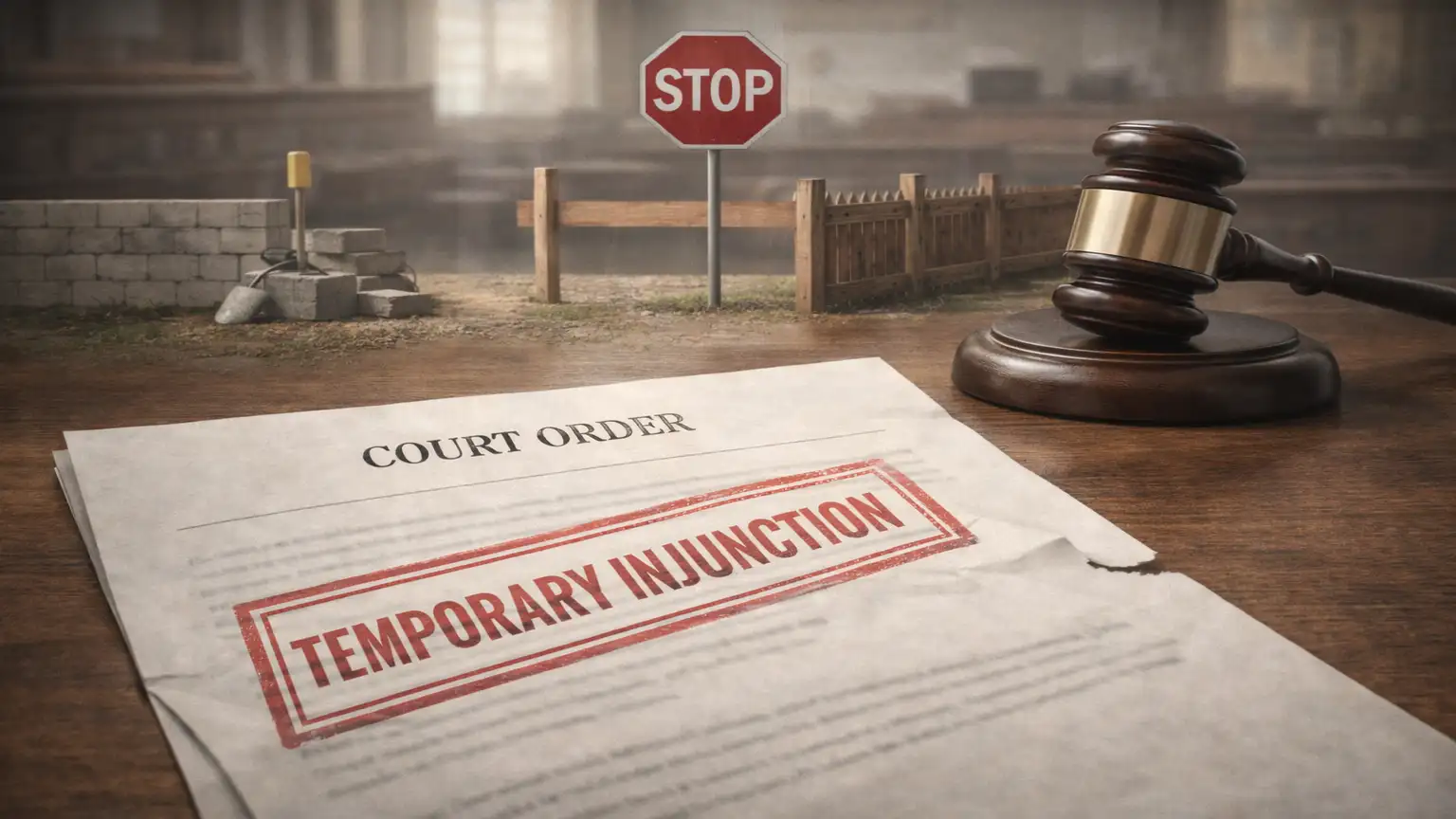What is Temporary Injunction or Stay Order?
It is provided in rule 1 of order XXXIX, of the Code of Civil procedure, 1908 that where the suit property is in danger of being damaged, wasted or alienated by any party to the suit or being sold wrongfully during execution proceedings or where there is intention of removal or disposal of property by defendant to defraud his creditors, the court may on application of plaintiff, grant temporary injunction to restrain such acts until the disposal of suit or until further orders. It is also called as stay order.
Temporary injunction may be of two kinds. One is “Ad-interim” i.e. the one which is passed in the absence of defendants and it shall not ordinarily exceed fifteen days. However, it may be extended in case injunctive order couldn’t be served to defendant not by fault of plaintiff or where defendant himself seeks time for defense of application of temporary injunction.
Second type is the one which is granted after hearing both parties or after serving notice to the defendants and this kind of injunctive order shall cease on expiration of a period of one year, or on disposal of suit whichever is earlier unless the same is discharged or set aside by the court earlier. Although there are certain differences between both, however, one thing is common that both of these are granted and exist during pendency of suit only.
Grounds for Temporary Injunction
It is settled principle of law that an injunctive order is to be granted by the court after taking into consideration the following three essential grounds:
1. Whether a prima-facie case exists in favor of the plaintiff?
2. Whether the balance of convenience also lies in favor of plaintiff?
3. Whether the plaintiff would suffer irreparable loss if the stay is not granted?
Atif Ahmad Vs. Securities and exchange commission Pakistan
2023 CLD 313
Marghub Siddiqi vs. Hamid Ahmad Khan and 2 others
1974 SCMR 519
Puri Terminal LTD vs. GOVT. OF PAKISTAN
2004 SCMR 1092
Additional Grounds for Injunction
The enactment and the precedents are in line on the point that the one who seeks equity must do equity. The temporary injunction is a discretionary relief and while considering the question of grant of this relief, the courts have to take into account the co-existence of prima facie case, balance of convenience and irreparable loss and injury in favor of a party seeking such relief. While weighing a case’s merits based on these criteria, the courts may take into account a party’s overall conduct.
i.e.
(a) Whether the plaintiff has sought relief after considerable delay, and he has not acted vigilantly and promptly?
(b) Whether the plaintiff has not approached the Court with clean hands?
(c) Whether grant of injunctive order in favour of the plaintiff will be against public interest/public policy?
(d) Whether grant of injunctive order to the plaintiff will place him in an undue advantage which will perpetuate injustice?
(e) Whether the loss/damage likely to be suffered by the plaintiff due to refusal of stay will be calculable in terms of money?
(f) Whether the party approaching the Court for grant of stay has suppressed material facts and acted in a mala fide manner?
If the answer to any of these questions is yes, the relief of temporary injunction, which is discretionary in nature, may be rejected while taking the particulars of each case into account.
ATCO LAB.(PVT.) LIMITED V. PFIZER LIMITED
2002 CLD 120
Syed Kamal shah V. Govt. Of N.W.F.P
2010 SCMR 1377
Mst. Sharifan Bibi and others. V. Muhammad Abid Rasheed
2011 YLR 2396
Mst Saeeda V. PROVINCE OF PUNJAB AND OTHERS
2014 CLC 65
Stay Granted where there is no good prima facie case:
It is not necessary in all cases of temporary injunction for the plaintiff to have a strong, good prima facie case, rather, an arguable case is sufficient. Following case laws are relevant to this proposition:
Islamic Republic of Pakistan through secretary Ministry of Commerce v. General Traders and Manufacturers LTD through chief executive
2008 CLC 1462
Islamic Republic of Pakistan through secretary Establishment Division Islamabad v Muhammad Zaman Khan and others
1997 SCMR 1508
Pakistan International Airlines Corporation V. Messrs hazir Pvt (Ltd)
PLD 1993 kar 190
Firozuddin Ahmed v. Trading Corporation of Pakistan Ltd
1987 MLD 124
Where interim injunction is granted for a specific date:
Where the interim relief is granted for a specific date, and it is not extended through a speaking order by that court as such it would lose its efficacy.
Mst Salman Bibi and others V. MEMBER (JUDICIAL -V) BOR CHOEF SETTLEMENT COMMISSIONER AND OTHERS
2013 CLC 776
Where no specific date is mention in injunctive order:
As a general rule, it is provided in Rule 2-A of the O. XXXIX of the Code of Civil procedure, 1908 that ordinarily the interim injunction does not exceed 15 days. However, the interpretation is done by the apex courts that this provision is not mandatory in nature rather it is only directory in nature which provides guideline to the court to not grant interim relief exceeding 15 days ordinarily. The only requirement is that the court should extend it, however, if it is not extended by specific order, it would be presumed that the same is extended unless any specific order is passed for its exists for vacation.
Raja Talat Mehmood V. Ehtisham ul Haq
2000 MLD 1755
Difference between Ad-interim and Temporary Injunction:
Type. As per rule 2A of the O. XXXIX of the Code of Civil procedure, 1908, Ad-interim stay is the one which is granted ex-parte ( i.e. in absence of defendant) , whereas, as per rule 2B & 3 , the temporary injunction is the one which is granted after hearing both parties or after serving notice to the defendants.
Relevant Law. Ad-interim relief is dealt under rule 1,2 &2-A of O. XXXIX, whereas Temporary injunction is dealt under section 53 of the Specific Relief Act, 1877 read with rule 1,2,3 of the O. XXXIX.
How to assail. Ad-interim injunctive order can be discharged, varied, set aside by the trial court itself under O. 39, rule 4, it can also be challenged at appellate forum under O. 43, rule 1. However, the temporary injunctive order can only be challenged at appellate forum and trial court has no power to change it.
Muhammad Qasim V. Tahir Saleem
2004 MLD 1820
Record. For stay u/s 53 specific relief act, the documents tendered by other party with his written reply shall also be considered. For ad-interim stay, only those documents can be considered which were part of the record at the time of filing of application.
Muhammad Zareef Khan V. Muhammad Maroof Khan
2009 YLR 2454.
Duration. Ad-interim stay ordinarily continues till 15 days until extended. On the other hand, temporary injunction continues till specific date or order or till disposal/decision of suit, which ever is earlier.

